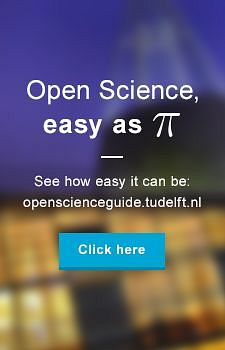A new Open Access policy was announced by TU Delft Rector Magnificus Karel Luyben at the recent Dies Natalis, or Foundation Days celebration. Effective from May 2016, this policy supports the full-text depositing of scientific publications in the TU Delft Repository.
Although this sounds like a new development, the TU Delft library has been actively working on Open Access publishing for the last ten years according to Chantal Brokerhof, Program Manager of Open Science. Not only on the technical infrastructure and storage, but also building up and sharing knowledge about copyright and publishing services. Since 2008, the TU Delft Library also provides financial support with the Open Access Fund. This open access policy can be seen as a follow-up of the signing of the Berlin Declaration on Open Access 2005. “The current state of open access is that of transition,” said Just de Leeuwe, publishing advisor. “This process can be seen as an evolution rather than a revolution.”
In addition to supporting the mission of TU Delft to deliver science to society, the new policy also ensures compliance with objectives set up by the State Secretary for Education, Culture and Science of the Netherlands for Dutch universities: 60% of peer-reviewed publications should be available through Open Access in 2018, and up to 100% in 2024. The Open Science team is confident that they can meet those guidelines. “Today we have already in the TU Delft Repositories 122.000 descriptions (metadata records) and 160.000 files (assets),” said Brokerhof. “The TU Delft Repositories counted 2.5 million visits since 2006, 1.5 million unique visitors and 7.4 million page views.”
The team faces some challenges with implementing the new policy. In the short term, the challenge is with the technical implementation of PURE, their new current research information system (CRIS). It allows them to store rich metadata, make metadata findable, upload full text publications and also delivers management reports to measure open access publications per document type and per faculty. “For the long term a big challenge is to create more awareness of open access publishing: an open access attitude among researchers,” said Brokerhof. “That open access publishing should be the default. Open access is about sharing & receiving: it provides added value for both individual researchers as society.”
The new Open Access policy follows on the heels of the Open Science Programme, which the TU Delft Executive Board approved last year. Brokerhof said this programme is important because they continue to work out open science activities like data stewardship. They expect to develop a data policy later this year in close cooperation with the faculties.
To learn about current guidelines and steps for researchers check out the Open Science How to Guide.



Comments are closed.